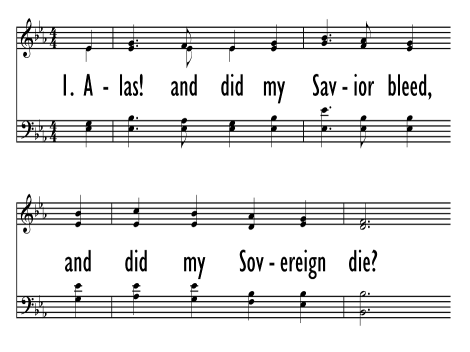- |
User Links
Alas! And Did My Savior Bleed
Hymn Information
- First Line
- Alas! And did my Savior bleed
- Author
- Isaac Watts (1707, alt.)
- Tune Name
- MARTYRDOM
- Composer
- Hugh Wilson (ca. 1800)
- Adapter
- Robert Smith (1825)
- Arranger
- Nolan Williams Jr, b. 1969
- Topic
- Church Year: Good Friday · The Cross · Jesus Christ: Atonement · Jesus Christ: Blood of · Jesus Christ: Confidence in · Jesus Christ: Savior · Jesus Christ: Suffering · Surrender · Testimony/Witness
Copyright Information
- Text Copyright
- Public Domain
- Tune Copyright
- Arr. © 2000 GIA Publicatins, Inc. · Adapt. - Public Domain
- Reprint/Projection Information
- Words: The Words are in the Public Domain; you do not need permission to project or reprint the Words.
- Music: Permitted with a license from OneLicense.net. If you do not own this license, please contact the copyright holder for permission.
Full Text
Scripture References
Further Reflections on Scripture References
Watts' original heading for the text, "Godly sorrow arising from the suffering of Christ," fits stanzas 1-3 well. Stanza 3 contains the profound paradox of God the creator dying for the sin of human creatures: "Christ, the mighty Maker, died for his own creatures' sin." Stanza 4 moves from penitent sorrow to gratitude and tears of joy.
Confessions and Statements of Faith References
Further Reflections on Confessions and Statements of Faith References
This song reflects the narrative of the suffering and death of Christ on Calvary, events whose significance and purpose is deepened by the confessions of the church. Heidelberg Catechism, Lord’s Days 15-16, Questions and Answers 37-44 explain the significance of each step of his suffering. Question and Answer 40 testifies that Christ had to suffer death “because God’s justice and truth require it; nothing else could pay for our sins except the death of the son of God.”
The Belgic Confession, Article 20 professes that “God made known his justice toward his Son…poured out his goodness and mercy on us…giving to us his Son to die, by a most perfect love, and raising him to life for our justification, in order that by him we might have immortality and eternal life.”
Consider also the testimony of Belgic Confession, Article 21: “He endured all this for the forgiveness of our sins.”
Alas! And Did My Savior Bleed
Call to Worship
Assurance
Who has believed what we have heard?
And to whom has the arm
of the Lord been revealed?
For he grew up before him like a young plant,
and like a root out of dry ground;
he had no form or majesty
that we should look at him,
nothing in his appearance
that we should desire him.
He was despised and rejected by others;
a man of suffering
and acquainted with infirmity;
and as one from whom others
hide their faces he was despised,
and we held him of no account.
Surely he has borne our infirmities
and carried our diseases;
yet we accounted him stricken,
struck down by God, and afflicted.
But he was wounded
for our transgressions,
crushed for our iniquities;
upon him was the punishment
that made us whole,
and by his bruises we are healed.
Alas! And Did My Savior Bleed
Hymn Story/Background
Watts' original heading for the text, "Godly sorrow arising from the suffering of Christ," fits stanzas 1-3 well. Stanza 3 contains the profound paradox of God the creator dying for the sin of human creatures: "Christ, the mighty Maker, died for his own creatures' sin." Stanza 4 moves from penitent sorrow to gratitude and tears of joy.
MARTYRDOM was originally an eighteenth-century Scottish folk melody used for the ballad "Helen of Kirkconnel." Hugh Wilson adapted MARTYRDOM into a hymn tune in duple meter around 1800. A triple-meter version of the tune was first published by Robert A. Smith in his Sacred Music (1825), a year after Wilson's death. A legal dispute concerning who was the actual composer of MARTYRDOM arose and was settled in favor of Wilson. However, Smith's triple-meter arrangement is the one chosen most often. The tune's title presumably refers to the martyred Scottish Covenantor James Fenwick, whose last name is also the name of the town where Wilson lived. Consequently, in Scotland this tune has always had melancholy associations.
MARTYRDOM has an effective melodic contour. Sing in harmony with subdued accompaniment. One pulse per bar permits singing in two long lines rather than four phrases.
Author Information
Composer Information
Best known for his work as Chief Music Editor of the bestselling African American Heritage Hymnal—a critically acclaimed compendium of music, with sales now surpassing 300,000 books worldwide, Williams is a noted scholar who has lectured extensively, including keynote addresses for the National Academy of Religion, Yale University’s Parks-King Lecture Series, Festival Musica y Filosofia (Naples, Italy), and Georgetown University Law School. He has also been featured on PBS, BET, the Word network, and internationally in the UK, France, Italy, and Slovenia.
Williams has written and produced music for television, film, and live events of national and international prominence. His eclectic compositional library includes: songwriting collaborations on numerous Grammy-nominated projects; commissioned compositions by Georgetown University and the National Symphony Orchestra; musical works performed by some of the country’s leading orchestras, including the Charleston Symphony, Memphis Symphony, and Kennedy Center Opera House orchestras; and, original gospel songs featured on his debut CD, inSpiration, released nationwide in 2010. He has collaborated with a range of industry artists—from Aretha Franklin, Gladys Knight and India.Arie to Denyce Graves, Yolanda Adams, and Michael McDonald.
Through NEWorks Productions, Williams has produced inspirational arts programming with the Smithsonian Institute, the U.S. Army, Georgetown University, the Arts and Humanities Council of Washington, DC, and the Dallas-based Black Academy of Arts and Letters. Williams and NEWorks have been especially privileged to collaborate with the Kennedy Center on a number of landmark projects, including musical direction of the finale for the 77th Birthday Tribute for Senator Edward M. Kennedy and production of the 105 Voices of History HBCU National Choir concert. Most recently, Williams has worked alongside Garth Ross, Director of the Kennedy Center’s Performing Arts for Everyone program, to plan an unprecedented nine-day celebration, as the Artistic Consultant for Joyful Sounds: Gospel Across America. Williams is also the Artistic Director for the National Symphony Orchestra’s first-ever full concert of African American sacred music on Saturday, April 24, 2010.
Williams serves as Minister of Music at the Metropolitan Baptist Church in Washington, DC. He also consults with numerous churches across the country on matters of music ministry and worship. In October 2010, Williams will return to his alma mater, Oberlin College (Oberlin, Ohio), to conduct master classes and serve as Music Director for the Northern Ohio Hymn Festival.


 My Starred Hymns
My Starred Hymns






